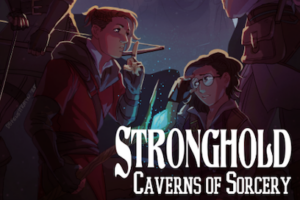 Deep beneath the earth, the dragon is rising! Quest into mysterious underground caverns and forests to learn magical secrets, draw strength from friends and family, secure alliances that can save your home, and carry on the heroic legacy of Stronghold!
Deep beneath the earth, the dragon is rising! Quest into mysterious underground caverns and forests to learn magical secrets, draw strength from friends and family, secure alliances that can save your home, and carry on the heroic legacy of Stronghold!
Stronghold: Caverns of Sorcery is an interactive fantasy novel by Amy Griswold, where your choices control the story. It’s entirely text-based—380,000 words and hundreds of choices—without graphics or sound effects, and fueled by the vast, unstoppable power of your imagination.
Choice of Games editor Mary Duffy sat down with author Amy Griswold to talk about the upcoming game and some of her other works. Stronghold: Caverns of Sorcery releases Thursday, January 30th—you can wishlist it on Steam today, it really helps, even if you don’t plan to purchase it on Steam.

Amy Griswold, Choice of Games Author
We’re returning to the world of Stronghold: A Hero’s Fate. This is something of an indirect sequel, right?
Yes, it’s a chance to revisit the town founded in Stronghold: A Hero’s Fate with a new generation of characters facing new challenges. The influence of your town’s founding hero determines the starting situation of your town and the personality of your grandparent, the town’s current leader. But for players who want to jump in without playing the first game, there’s the option to choose a preset backstory or make detailed choices about your town’s history when you begin the game.
How was it for you picking back up the threads of the Stronghold universe?
I really enjoyed revisiting the world of Stronghold and getting to explore some corners of it in more detail. In Stronghold: A Hero’s Fate, the goblins are mostly seen at a distance, and the dryads are enigmatic forest protectors. Stronghold: Caverns of Sorcery takes a closer look at both goblins and dryads, with befriendable (and romanceable) goblin and dryad NPC companions. It was also interesting to write a game primarily focused on sorcery. In Stronghold: A Hero’s Fate, it’s possible to never engage with the lost magic of your ancestors at all. In Stronghold: Caverns of Sorcery, the player character and their friends Corbin, Zoe, and Fox are all sorcerers, and “I use sorcery!” is the obvious way to approach a lot of problems. This required making the magical system more complex and varied, with options to focus on the knotwork of goblins and dryads or the experimental science of alchemy as well as rediscovering your ancestors’ lost arts.
Between these two games you published The Play’s the Thing with us, which is a fantastic game, and a fantastically different setting. Tell me a bit about the inspiration there, because within the Amy Griswold canon we’ve also got one of my all time favorite games, The Eagle’s Heir, which is a wonderful Napoleonic alt-history. You seem adept at jumping around in genre.
I like changes of pace. The Play’s the Thing was a fabulous chance to play with a bunch of dramatic tropes that would probably be over the top in a Stronghold game — wicked rulers, troubled heirs, long-lost siblings, and a deadly curse! plus a dancing bear! — while at the same time exploring what it’s like to try to make art that means something while the world is falling apart around you. The Eagle’s Heir is a swashbuckling steampunk adventure with airship racing and dastardly plots, but it’s also about how personal choices can shape political change. And both Stronghold games are fantasy adventures built around the tropes of classic tabletop games, and are also about how your choices influence other people in a small community. To me, the Choice of Games format is well suited to games that let players soak up the atmosphere of a particular genre, while at the same time exploring the reasons why choices and stories matter.
What surprised you most about the writing of Stronghold: Caverns of Sorcery?
I kept finding edge cases carried over from A Hero’s Fate that I had forgotten were possible and needed to be accounted for. What happens if the original player character has no children (biological or adopted) and no nephew, and then chooses a protégé as their heir, and then their protégé dies, leaving no one the right age alive to be the grandparent of the player character in Caverns of Sorcery? Etc.
There’s a dragon in this game. Choice of Games is a dragon-heavy publisher. Please say a bit about your dragon.
Dragons are useful because they give player characters a problem to react to in interesting ways. It’s hard to ignore a dragon. The dragon in Caverns of Sorcery was imprisoned by your ancestors centuries ago in the caverns near your town. It would very much like to escape, set your town on fire, and feast on the survivors. What else the dragon wants is possible to explore over the course of the game. But this isn’t, at its heart, a game about a dragon; it’s a game about a situation where doing nothing will lead to disaster, so you have to try doing something. What kind of “something” is up to you.
In addition to writing interactive fiction for us, you’re also a prolific novelist, I’d love to tell our readers about other works of yours they can enjoy.
Fans of the steampunk world of The Eagle’s Heir may enjoy the gaslamp fantasy mysteries Death by Silver and A Death at the Dionysus Club (with Melissa Scott), in which metaphysician Ned Mathey and detective Julian Lynes solve mysteries and navigate the fascinatingly awful world of Victorian London and its gay community. And for sci-fi adventure, I recommend the Stargate Legacy series, a virtual fifth season of tie-in novels set after the end of the Stargate Atlantis TV series (start with Homecoming by Jo Graham and Melissa Scott.)
What are you working on next?
I’m working on revisions to a science fiction novel, Gyre, that’s under contract for probably sometime in 2026, and I’ve got a couple of historical fiction projects on the back burner as well.

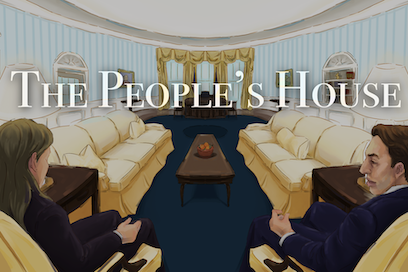


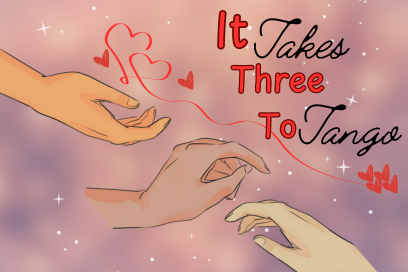

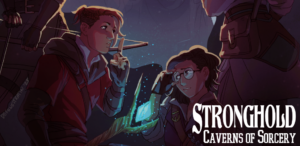
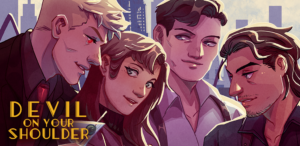


 Steam
Steam Twitter
Twitter Facebook
Facebook Tumblr
Tumblr RSS Feed
RSS Feed

